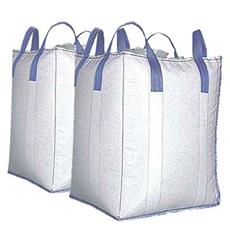Bulk bags – also called FIBCs (flexible intermediate bulk containers) or builders bags – are industrial containers used for storing and transporting bulk goods. They were designed to be a more cost-effective and environmentally-efficient alternative to using multiple sacks. A single bulk bag can replace a pallet of sacks, requiring less cost and fewer materials.
Bulk Bags are made with PVC rubber but modern day-FIBC are fabricated from a woven polypropylene fabric and hence they are sometimes referred to as PP bags. Polypropylene is resistant to mildew. It also has moderate resistance to heat, shrinking and stretching. Woven materials are stronger and of higher quality than nonwoven fabrics. The layers are woven over and under each other.


Reusing bulk bag
FIBCs can be reused if they have been treated correctly, but they must be multi-trip bulk bags with a 6:1 Safety Factor rating. Some companies provide FIBC cleaning services, including collection, inspection, and cleaning, so that they may be returned for further reuse. Reuse of FIBCs encourages sustainability and a circular economy, as reusing refurbished bags reduces waste and dependency on raw materials.
Recycling bulk bag
Bulk bags are recyclable. Most FIBCs are made from virgin PP, a common plastic that can be repurposed into other plastic products. Such as battery cables, brooms, brushes, trays, bins, and auto parts.
How bulk bags are recycled
Like with other industrial plastics, the recycling process begins with the proper collection. Recyclers require that the material is compacted into bales for easy collection and optimal market value. FIBCs are collected in large quantities, so recycling is usually feasible only for businesses with a sizeable output, or ones that can store the bags over time.
Once collected, the mill-sized bales are taken to a reprocessing center, where they are sorted and cleaned. As they are commonly used to transport a variety of materials, including fertilizers and chemicals, it is essential that bulk bags are thoroughly decontaminated before being recycled. All zips and buttons are also removed.
Explore the extensive range of one-ton Jumbo bags at Rockwell today. Visit their website for more information and to place your order hassle-free.








